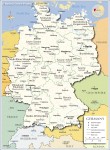Weather: Germany
Although Germany covers a fair amount of north–south distance – from the Alps to the northern seas – the weather doesn't vary a tremendous amount across this reach. There's no more than about 5°C/8°F difference in the average temperatures of Germany's major cities. As is the case elsewhere in northwest Europe, it rains or snows […]
Germany Looks Ahead
Charlemagne is often recognized as the founder of the French nation, but he was also responsible for the creation of the Holy Roman Empire and the development of the many small states within the Kingdom of Germany. Somewhat ironically, another French leader, Napoleon, was responsible for the fall of the Holy Roman Empire. From this […]
Living in Germany Today
Between 1945 and 1990, Germany was divided into a prosperous capitalist West Germany and a poorer Communist East Germany. Nonetheless, people in East Germany lived better than those in other Eastern European countries. Most had a television, a refrigerator, and a car even if they were of poorer quality and came with a high price […]
Germany’s Economy
Typical of modern industrialized countries, Germany has fewer than 3 percent of its workforce engaged in extractive industries. The North Sea has been a traditional fishing ground with herring being the most important catch. However, over-fishing has resulted in a decline in the fishing industry, and Germany now relies on imported fish to meet its […]
Germany: Government and Politics
The modern political history of Germany is usually considered to have begun in 1871, when the German Empire was formed. It will be remembered that prior to this time, Germany consisted of hundreds of very small states that had been gradually unified into the 39 states of the German Federation. In 1848, representatives were elected […]
Germany: People and Culture
Given the devastation of two world wars, it might be expected that the population of Germany would be relatively small. In fact, with slightly more than 82 million people, Germany's population is nearly 20 million larger than that of any other European country except Russia. This chapter examines the people of Germany—their demographic makeup, economic […]
Germany Through Time
Remains of the earliest people known to have lived in the area of present-day Germany were found in the Neander Gorge near the city of Dusseldorf in 1856, thus they were called Neanderthals. They were cave dwellers who lived more than 30,000 years ago. Although a human species, Neanderthals were not entirely identical to present-day […]
Germany: Physical Landscapes
Germany has an area of 137,847 square miles (357,021 square kilometers). It stretches about 520 miles (840 kilometers) north to south, reaching from 47 to 55 degrees north latitude, and 385 miles (620 kilometers) east to west, between 6 and 15 degrees east longitude. The terrain can be divided into three regions that increase in […]
Introducing Germany
A review of twentieth-century history would be incomplete without reference to Germany. During the past century, Germany was involved in two world wars. Following its defeat in World War II, its division into East and West became a major symbol of the larger division of the postwar world, just as its reunification in 1990 served […]

Germany
Area 137,845 square mi (357,021 square km) Population 80.89 million 2014 Capital Berlin Highest Point 9,721 ft (2,963 m) Lowest Point -11 ft (-3.54 m) GDP $3.853 trillion 2014 Primary Natural Resources iron ore, coal, potash, timber, lignite. THE FEDERAL REPUBLIC of Germany is one of the largest countries and has the largest population in […]